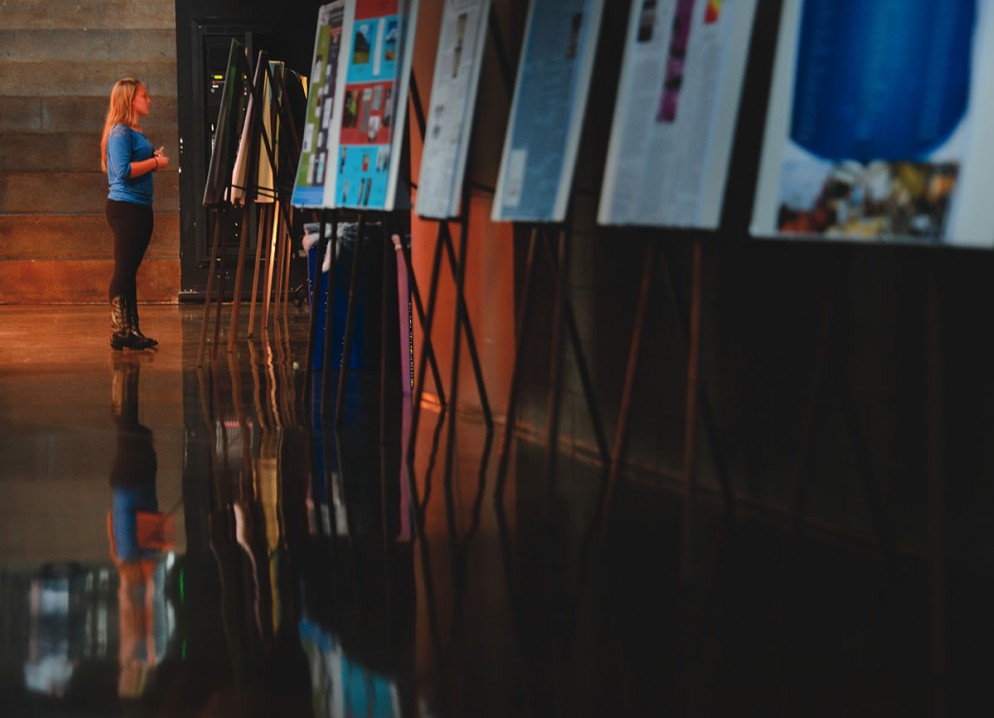Not so long ago, nearing completion of my master’s degree at Dartmouth College, I found myself presenting research from my dissertation to a room filled with suited and booted professors, classmates, and college community members. I had practiced the night before, and felt confident. My research was strong, the paper well-written, and the audience was keen to hear me speak. It went well but, in hindsight, it also could have gone better. Now, having attended the recent Undergraduate Summer Research Symposium here at Colorado College, I think that I might know why.
One of the great strengths of a CC education is the near-requirement to actively engage with and seek out materials, texts, and topics. The Block Plan allows dexterity of thought and process to develop over time, both in faculty and students.
The Undergraduate Summer Research Symposium in September served as the perfect showcase for these two groups, highlighting their combined research projects.
Held in the Edith Kinney Gaylord Cornerstone Arts Center, more than 100 members of the Colorado College community gathered to view presentations and poster sessions from CC students and their faculty supervisors. The symposium was sponsored by the President’s Office and the Dean’s Office.
“It was so wonderful to see the enthusiasm in the students as they presented their work from this past summer,” said Lyrae Williams, assistant vice president for institutional planning and effectiveness.
“It was exciting to see the results of all the planning and work that went into this summer’s projects, including those funded by the Andrew W. Mellon Foundation in the humanities and humanistic social sciences,” she said. “Next year will be even bigger!”
The summer of student and faculty collaborative research was funded by the Faculty Student Collaborative Grant and the Andrew W. Mellon Foundation Grant. The Faculty Student Collaborative Grant involves students in the research of a CC faculty member, providing them with first-hand research and presentation experience to complement their classroom experiences at CC. Offering students $2,500 for a 10-week commitment and their faculty mentors $500 toward their research, this grant is a vital part of CC’s continued commitment to involving students in experiences that provide immersive and explorative learning.
One presentation was that of history and political science major Erik Laitos ’15, who worked with Professor of History Susan Ashley on research titled “Deviance in the Fin-de-Siecle: Misfits and Sexual Inverts.” The culmination of a summer’s work, Laitos combined Ashley’s research into medical analyses, diagnoses, and treatments of “misfits” in the late-19th century with his own manuscript review, revision, and bibliographic assistance.
Laitos said that despite having “no previous background in archival research,” he was able to glean a huge amount from the complex, high-level research.
“I spent hours poring through books and articles, making me a more informed student and a much better researcher,” he said. “My summer research experience proved invaluable in improving my time management, organization, and independent study skills.”
Poster sessions ranged as greatly as the presentations, with topics ranging from anaerobic capacity testing to African sleeping sickness to research into George Gershwin’s “Rhapsody in Blue.”
Williams said she was “taken by the buzz of energy in the main space of Cornerstone from the excitement of the poster presentations and the previous oral presentations. I only wish I could have talked to every student who had participated in the project this summer.”
